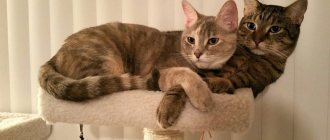Heated discussions regarding cat self-walking have divided cat owners into two camps. Some of them believe that a domestic cat should not leave the confines of an apartment or house, while others argue that forced confinement within four walls can hardly be considered caring for a pet. However, there are situations when the animal must be under the constant supervision of the owner (illness, injury, condition after surgery, estrus, etc.), and then it is necessary to re-educate the mustachioed-striped one, instilling in him an exclusively home regime.
“I, a cat, go wherever I please, and I walk on my own.”
Some purebred cats that have never left the apartment perceive the street as an alien environment and experience severe stress if they accidentally find themselves outside their native walls. Transporting such animals turns into a whole adventure, and training them to walk on a leash turns into a long training process.
However, most representatives of the cat tribe are freedom-loving and independent, therefore, having once tasted freedom, they will be eager to go outside again and again. It is noteworthy that the mustachioed striped animals seem to store within themselves all the experience of their wild ancestors and very quickly adapt to life in the natural environment. The street is attractive to cats for many reasons, including:
- Genetic memory of ancestors . This applies to the ubiquitous cats of the “noble” breed, whose parents and grandparents led a free life and took care of their own food and safety.
- Hunting instinct . A bloodthirsty predator slumbers in every murka, so the innate desire to ambush neighboring pigeons or the excitement of mouse hunting can provoke frequent unauthorized absences.
- Territorial instinct . A cat considers an apartment to be its territory, but individuals leaving the home expand their private boundaries and set up “control points” in the form of scent marks. Once in the wild, the first thing the cat does is walk around its property, examine the “messages” from its relatives and update its personal marks.
- Sexual instinct . The instinct of procreation forces sexually mature animals to persistently look for a mate and have offspring. Everyone knows the loud night serenades of March cats and brutal fights with opponents. Periods of sexual heat in cats (estrus) can also proceed very violently, accompanied by refusal to eat, characteristic poses and calling calls.
- Orienting instinct . Curiosity and the desire to discover new horizons are especially characteristic of young animals, so striving outside for a cat means fighting boredom and monotony.
- Social behavior . Despite the fact that many cats are loners, they are not alien to communication with their relatives and the corresponding manifestation of emotions.
- Need for physical activity . Domestic cats spend up to 18 hours a day in a sleepy and drowsy state, but exercise and exercise are important for them to maintain muscle tone and overall health. In freedom, this can include cross-country running, jumping, gymnastics and overcoming various obstacles.
- Energy discharge and activation of metabolism . Undoubtedly, cats with regular access to the street do not suffer from poor appetite, physical inactivity and obesity.
- Psychological hardening and personal experience . On the street, the animal is exposed to various stimuli, including negative and potentially dangerous ones, but gradually learns to choose the right course of behavior and resist stress factors. Undoubtedly, the nervous system of a street cat is much more stress-resistant than the pampered psyche of an animal that considers the apartment its whole world.
- Change of residence . It is known that cats are more attached to a place than to their owner. Therefore, moving may provoke a desire for the mustachioed one to return to his homeland.
- Lack of contact with the owner, bad attitude . Despite the relative independence of cats and the ability to distance themselves when communicating with people, they are very sensitive to negativity and may prefer the street to a home where they are not welcome.
Why else can a cat meow?
An animal can vocalize and irritate household members for the following reasons:
- Attracting the attention of owners due to boredom. Most often, the cat is begging for a treat or an additional portion of food in this way. Just keep your pet busy - play with it, pet it or offer a new toy;
- Disease (difficulty with digestion or stool, helminthic infestation, Alzheimer's disease, etc.);
- Bad mood or revenge on the owner for punishment. An animal, like people, can experience negative emotions, which manifest themselves in the form of loud screams, chaotic running around the apartment and hissing.
Dangers of self-walking
Accustomed to going AWOL, the cat usually returns home, but the absence can last several days and is associated with various dangers and troubles.
A cat walking on its own can:
- die under the wheels of a car;
- wander far from home and get lost;
- become a victim of flayers;
- being maimed or killed by dogs;
- get injured in a fight with rival cats;
- contract an infection or parasites;
- eat poisoned bait or rodent;
- to climb a tree out of fear and not be able to get down.
The result of a female cat's street adventures is usually an unexpected litter that has to be disposed of. In addition to such surprises, the roaming cat increasingly moves away from the owner and becomes, in fact, a stray animal, coming home once every couple of days to eat and take a little nap.
How not to behave
Of course, when it seems that you have taken all the measures - fed, watered, caressed, survived the sterilization period, and the cat still screams at night, then even the calmest owner will lose his nerve. But under no circumstances should you use violent measures against an animal or shout at it. After all, a cat is a very smart creature; it has a sense of revenge. And how she will take revenge is unknown.
In addition, cats are also proud animals, they will not tolerate any violence against themselves, it is impossible to achieve anything with the help of force, you just need to try to show patience and attention. Only in this case is it possible to obtain a positive result.
Ways to wean a cat off the street
If the owner has firmly decided to turn a freedom-loving animal into a purring pet, then he will have to radically change the pet’s behavioral habits and its psychology.
Undoubtedly, indoor confinement will at first be perceived as “house arrest,” and a cat accustomed to walking on its own will protest, get nervous, and persistently ask to be freed.
For the idea of “domestication” to be successful, first of all, additional measures are needed to correct the interior, namely:
- It is necessary to install strong mosquito nets or bars on the windows so that the mustachioed one cannot dive into the window or squeeze through the gap when the windows are open in ventilation mode. Having a cat within a closed balcony will brighten up the adaptation period, but if there is an open balcony, it is necessary to exclude the pet from access there.
- To reduce the cat’s desire to scratch the front or balcony door, jump on it and loudly lament about its plight, it is necessary to make the door an unpleasant and even frightening object. For these purposes, they use repellent sprays from pet stores, applying the contents of the container to the door leaf, laying out fresh citrus zest nearby, or simply stopping the cat’s decisive actions by spraying a stream of water from a spray bottle into its face, clapping their hands, or expressing their disapproval with a loud shout. If the cat knows how to open the door on its own by pressing the handle, then it is recommended to place a small light box with dry peas on top, and as soon as the tailed smart guy pulls the handle, the peas will begin to bombard from above without physically causing harm.
- To diversify the cat's leisure time, purchase various toys, a play complex with hammocks, hanging shelves, multi-level houses and teasers, as well as scratching posts of various configurations. So that the pet does not get bored and can realize its hunting instincts, the owner must allocate about an hour of time every day for active games and fun with the cat, training and practicing tricks. A splash of energy in the right direction and the development of good manners will prevent such unwanted manifestations of cat protest as torn curtains, scratched furniture and torn wallpaper.
- An “arrested” cat who is upset will need a secluded corner where he can calm down and fall asleep. Such a personal space can be a comfortable bed, a closed frame house or a soft “burrow-tunnel”. It is strictly forbidden to disturb an animal that has entered its den.
- In order to train to the toilet within an apartment, it is necessary to purchase a tray of a suitable size and wood filler that is as close as possible to natural litter. Felinologists recommend installing 2-3 trays in different places, giving the cat the opportunity to independently choose the most suitable place. The main rule is that the toilet area should not be located close to the cat’s dining room or sleeping area.
A pet is a living creature
The situation in our home is always under our control, so it seems to us. If you wanted to have a pet - once you eat, you have to go to bed - everyone should shut up. But cats don’t adapt to their owner’s wishes; they also have their own desires, needs, and even their own mood.
The surrounding residents are unhappy, the cat’s behavior is strange, and the screams at night are unreasonable. What to do in such a situation, after all, do not throw it out into the street?
The main thing is, if this happened and the cat started yelling, find out the reasons based on the symptoms. Indeed, you need to understand what is behind these symptoms.
A hormonal surge is the first and main reason for such behavior in a pet.
The beginning of March, a well-known time in the world of cats , who hasn’t heard of it? Modern windows save residents of the first floors of apartment buildings; close the window - no problem, silence. In private houses they also install such windows, but when a cat is yelling in the next room, what should you do? They just scream like that, cats have the same rules.
The greatest likelihood of such a cry is sexual hunting. In a situation where the cat is not sterilized, such a “concert” will be repeated regularly. He is not shouting out of arrogance or harmfulness, his time has come.
He shows the world around him his strength and readiness to reproduce . This is all in the hope that his other half will hear him and respond to his songs. This is one of the most powerful instincts in animals and attempts to suppress it will lead nowhere. All you have to do is wait it out.
We’ll touch on what to do and what to do, but now let’s remind you about what not to do.
Hormonal medications will help
Pet stores offer their own solution to these problems.
Hormone-based medications are sold in many pet stores. One drawback is that they are ineffective. The only one who calms down from these pills is the owner himself, while he is going home. The magic pill works something like this: The cat will scream less. The number of screams may decrease, even by half, but he will not stop screaming.
These sleepless nights, no matter what the owner will do to get enough sleep. So you have to turn to professionals at the pet store. Drugs come to the rescue, and not just one, there are many of them. There are also fakes among them, but that's another story.
It’s good if the product consists of chalk, but what if the drug contains hormones . Moreover, the quality and quantity for animals is not regulated by any standards.
It is difficult to imagine what side effects such drugs have. A pet store is not a pharmacy, and drugs are not sold by pharmacists. It is difficult even for a specialist to determine the effect of the composition of the drug on the body. What changes will occur in the endocrine system of the animal under their influence?
Very often, the manufacturer of veterinary drugs does not indicate the composition, indications and contraindications. Let’s put it simply: an incorrectly selected drug can harm your pet.
Screaming may be caused by illness
Quite likely the reasons for your pet’s incessant screams throughout the day after a successful operation may be a developing disease and the resulting discomfort in the pet’s body. Let's look at the most common ones:
- Abdominal pain: can occur when using poor quality food and can cause indigestion and pain.
- Worms and other parasites: cats visiting the street can acquire external (fleas, ticks) or internal (worms/helminths) parasites. That is why it is important to regularly treat animal fur and inspect it for ticks and fleas. If you cannot properly remove a blood-drinking tick yourself, it is better to contact a specialist. To rid your pet of worms, give him regular anthelmintics in strict accordance with the drug instructions. You can freely buy all the necessary medications either at a veterinary clinic or pharmacy.
- Urolithiasis (UCD): it is very common in castrated cats, and the animal can accompany each visit to the litter box with screams - it simply hurts. And if you already have an old cat and he screams while sitting in the tray, perhaps he has exactly this problem.
Possible diseases
Depending on age, possible diseases can vary greatly.
If your pet is already old and constantly yells, then he may have nervous system disorders or even Alzheimer's disease. This may occur due to age-related changes in the body, which have an irreversible effect. In this situation, a number of medications with a calming effect can help, which must be prescribed by a veterinarian. A good doctor will prescribe the correct course of treatment and write down personal recommendations
A young cat may scream heart-rendingly when injured and painful (most often acute pain in the abdominal area). It is quite easy for the owner to determine this at home: by palpating the belly, you can feel its condition - if the abdominal part is hard, swollen and the cat is trying in every possible way to avoid contact by scratching, then you need to take urgent measures and take your pet to the veterinarian. (normally the stomach should be soft and the animal should react calmly).
The main parasites that cause screaming in cats at any age are helminth infections. These worms are very common in fauna and operate mainly in the intestines of animals, which causes pain or can even lead to intestinal obstruction. The fault of the owners in such a situation will be the lack of regular prevention of worms in their pets. Usually it needs to be carried out from the first weeks of a cat’s life.
Urolithiasis is also a serious cause of pain, this is especially noticeable every time a cat visits the toilet, accompanied by plaintive cries. In this case, contact a specialist immediately.
Rules of care, transportation and rehabilitation
Regardless of the reason that prompted the owners to castrate their pet, you will need time for subsequent care for the cat. This includes:
- The immediate postoperative period, when the cat recovers from anesthesia and the effects of sedatives;
- Observation of the incision and treatment of sutures, if any;
- Continue to comply with the veterinarian’s instructions after the stitches are removed and the animal is fully restored.











